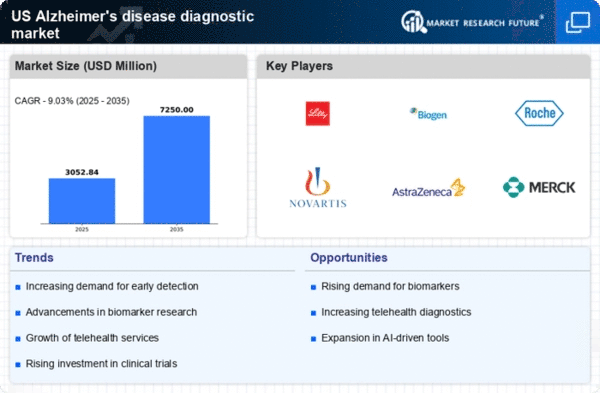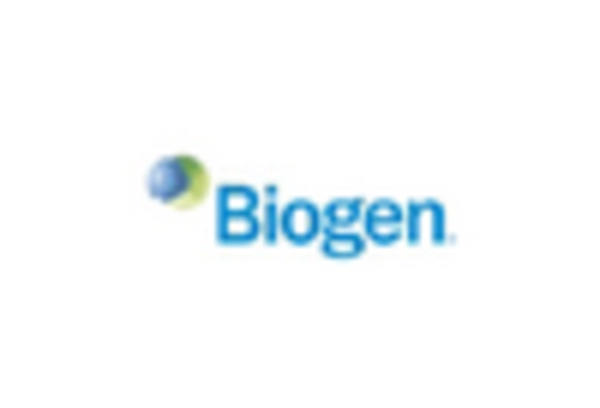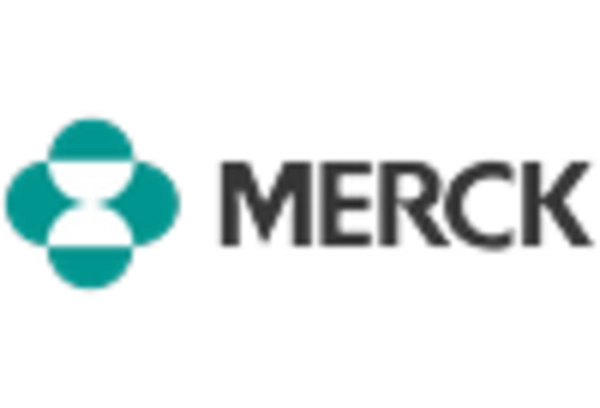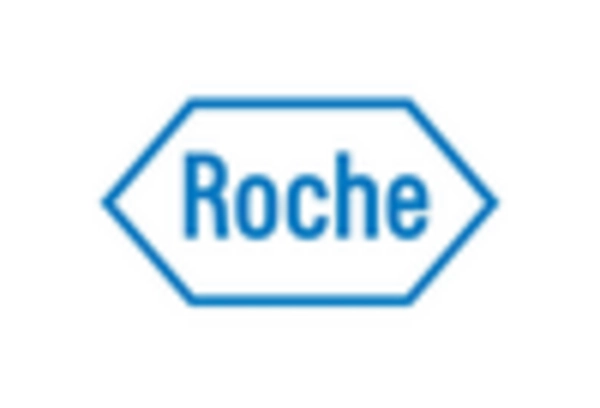Growing Demand for Early Diagnosis
The growing demand for early diagnosis of Alzheimer's disease is a significant driver for the alzheimers disease-diagnostic market. Early detection is crucial for effective management and treatment, as it allows for timely interventions that can improve patient outcomes. Surveys indicate that over 80% of healthcare professionals believe that early diagnosis can lead to better care strategies. This demand is pushing healthcare systems to adopt advanced diagnostic tools, including neuroimaging and biomarker tests. The market for these diagnostic solutions is expected to grow by approximately 12% annually as healthcare providers seek to meet the needs of patients and their families. This trend highlights the importance of developing reliable and accessible diagnostic methods.
Aging Population and Increased Awareness
The aging population in the US is a critical driver for the alzheimers disease-diagnostic market. As the baby boomer generation ages, the number of individuals at risk for Alzheimer's disease is increasing. This demographic shift is accompanied by heightened awareness of Alzheimer's and its impact on families and communities. Educational campaigns and advocacy efforts have contributed to a greater understanding of the disease, leading to increased demand for diagnostic services. It is estimated that by 2030, nearly 20% of the US population will be over 65 years old, further amplifying the need for effective diagnostic solutions. This growing awareness is likely to drive market growth as more individuals seek diagnosis and treatment options.
Rising Prevalence of Alzheimer's Disease
The increasing prevalence of Alzheimer's disease in the US is a primary driver for the alzheimers disease-diagnostic market. According to the Alzheimer's Association, approximately 6.7 million individuals aged 65 and older are living with Alzheimer's in the US as of 2025. This number is projected to rise significantly, potentially reaching 14 million by 2060. The growing patient population necessitates enhanced diagnostic tools and methods, thereby stimulating market growth. As awareness of the disease increases, healthcare providers are more inclined to adopt advanced diagnostic solutions, which could lead to a market expansion of around 10% annually. This trend underscores the urgent need for effective diagnostic strategies to manage the rising burden of Alzheimer's disease.
Increased Funding for Alzheimer's Research
In recent years, there has been a notable increase in funding for Alzheimer's research in the US, which serves as a crucial driver for the alzheimers disease-diagnostic market. The National Institutes of Health (NIH) allocated approximately $3.5 billion for Alzheimer's research in 2025, reflecting a commitment to understanding and diagnosing the disease. This financial support fosters innovation in diagnostic technologies, encouraging the development of novel biomarkers and imaging techniques. As research progresses, new diagnostic tools are likely to emerge, enhancing the accuracy and speed of Alzheimer's diagnosis. This influx of funding not only propels the market forward but also raises public awareness, potentially leading to earlier detection and intervention.
Technological Innovations in Diagnostic Tools
Technological innovations are transforming the landscape of the alzheimers disease-diagnostic market. Advancements in neuroimaging techniques, such as PET scans and MRI, have significantly improved the ability to detect Alzheimer's disease at earlier stages. Additionally, the development of blood-based biomarkers is emerging as a promising area of research, potentially offering less invasive and more cost-effective diagnostic options. The integration of these technologies into clinical practice is expected to enhance diagnostic accuracy and efficiency. As a result, the market is projected to experience a compound annual growth rate (CAGR) of around 11% over the next five years, driven by the continuous evolution of diagnostic tools and methodologies.
















